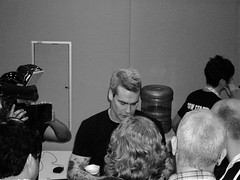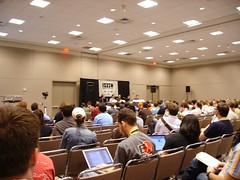(very different kind of liveblog vs. the previous session…the wisdom of crowds session was a monologue, this session was a group of about 70 people, and the conversation was truly that, and bounced around the room…trying to capture the salient points of a fast-moving discussion…)
Panelists:
 Tiffany Brown
Tiffany Brown
Melinda Casino
Barb Dybwad
Lisa Stone
Why do groups form online?
Barb, Melinda: What’s the difference between some types of online groups — cycling clubs, shared interest groups, bridge, political affiliations….there’s always been a desire to connect with similar individuals. Barb: why is that different when groups form around women, race, etc….it seems different somehow.
Brown: “The ‘why’ comes in…race, gender, sexual orientation…are not things you choose, they are things you are born with. If someone doesn’t have that identity, it’s difficult for others to understand why one would want to coalesce around such things.”
Does setting up a “private club” hinder a group?
Brown: When you have women-centered space, black-centered spaces, queer-centered space, you don’t get the outside chatter. You can focus on what you need to do as a group. At Blogher, the whole energy was different…there wasn’t the competitive ‘I’m smarter than you’ that is so typical at tech conferences.
Marshall Poe: Imagine I work for a national magazine. Imagine that 95% of the readers where white, upper-middle class. We wanted to brand the site for “wealthy people” … what would be the response?
Liza Sabater: It’s on the web. People are going to come from everywhere. You can’t control who will show up. Look at Orkut as an example.
Barb Dybwad: The elephant in the room is “power.” The demographic that you’re (Marshall) talking about already has power. For example…Congress.
Lt. Col. Joe Yoswa, USArmy: There are soldiers in the field blogging. Do you close that off, and just allow soldiers to talk amongst themselves, and what do you take away from that conversation by closing that segment off? What are you doing to that population by doing that?
Tiffany: You close it off, you get an echo chamber. When you close it off, when you only read one type of blog, you only see one perspective. I see that as the danger of the private space. You do need to step outside of your own identity, your own community to get other perspectives…
Stone: There are times, in certain parts of one’s life, you need to incubate, and only talk to others who are in the same place. But then, sometimes you become evangelical and want to get the word out about those issues.
Yoswa: We have a simple blogging policy. “Don’t talk about things you are doing in the field, with any level of detail.” That’s our only blogging policy.
Grace Davis: One of the important thing is to have “rules of engagement,” to create a “safe space” and not offend people. Community moderation is one method of doing this. We also created “Woolf Camp.”
JW Richard: I set up DigitalDrums.Net, for African-American podcasters. I wanted to make it more African-influenced…I never said “all black”…I wanted to get people to discuss their experiences…
Brown: One way to make it for people outside the core group to feel comfortable, and find a common ground. In our sites, we’ve talked “blackness” as a way to talk about being “The Other”…which is something that everyone can relate with, as they’ve been an outsider at some part of their life…
Al Chang: Does anyone have a private blog/mailing list that also covers the exact same topic as their public space, but in a controlled space?
Brown: In a private space, you have more civil discussions (usually) and more civil discourse. In a private space, it’s more possible for flame wars to erupt.
Stone: Is anger bad?
Brown: When anger comes from a black person, or a woman, it can be viewed as hysteria. When I read somebody who is really angry and becomes a rant, you question the wisdom of showing that face…there are repercussions…
Stone: It becomes a matter of credibility.
Ron Crose: I work with professional athletes. We had an angry user in the community…what are your suggestions when someone in the community becomes irate, and tries to influence others against your website?
Stone: What would you do if someone accused a site or blog of bias?
Brown: Don’t get angry. Talk to the person as a person. But realize, on the other end of that communication is a ::person::, and treat them as such. I’ve learned that responding politely results in a likewise polite response.
Casino: How do you handle disagreement? There is good disagreement: constructively challenging….you can engage in a dialogue. Bad disagreement results in anger. Now…anger can be a motivator. Anger results in action.
Audience question for panel: “Do feel there need to be policies or guidelines to those outside the community who attack or criticize?”
Barb: We have 90 different blogs, 180 different bloggers, and we don’t have a blanket policy.
Paige Maguire: One of my friends is a moderator for a LiveJournal community, and the moderators put a LOT of controls on the community. One of the things we constantly butt heads on is that the community moderators do things like ask contributors to alter content.
Liz Henry: Back to anger, I agree it can be productive, and there are situations where politeness and civility are NOT the right response. Sometimes anger is necessary to break the frame. We should not be afraid of an angry conversation that can be worked through and apologized for.
Nancy White: If we invested in a community, we are invested in maintaining a relationship, anger can be worked through. We can negotiate with each other to work through things. Context matters.
Belinda: I think there’s a whole “tone” thing. I’m a writer, and I get a lot of hate mail. I respond in a civil manner, and people usually apologize. When I lose control, and respond back in a sarcastic manner, sometimes people miss the tone and miss the sarcasm. The larger issue : we need to teach ourselves to be discerning, and to educate ourselves.
[UPDATE] I highly recommend following Liz Henry’s trackback down below this post…the last two ‘graphs, in particular, are spot on.









